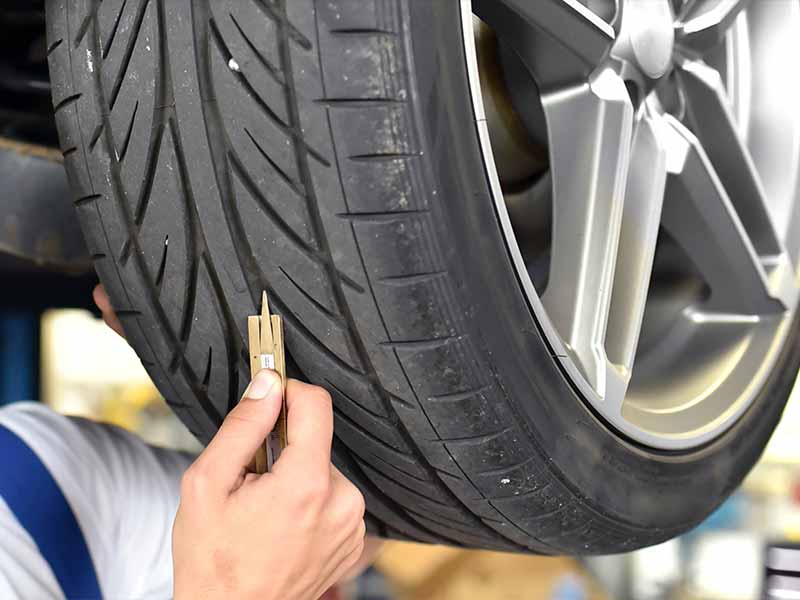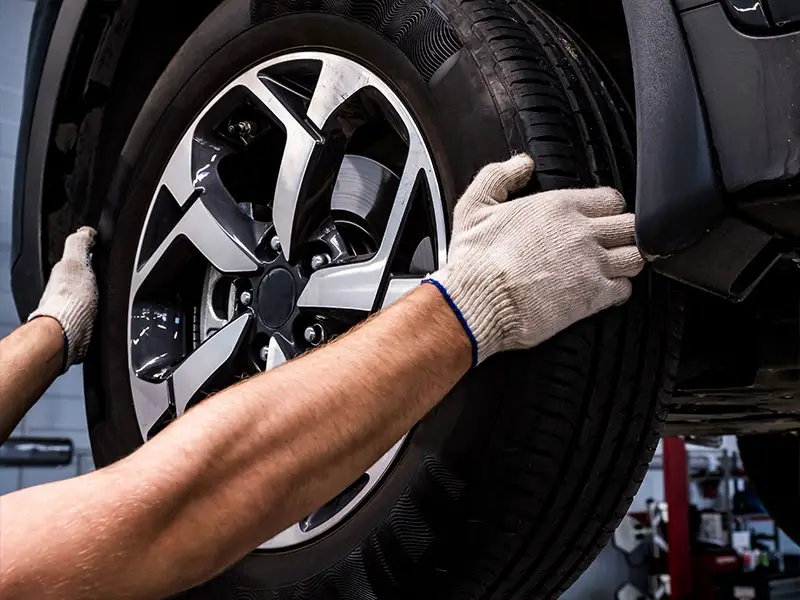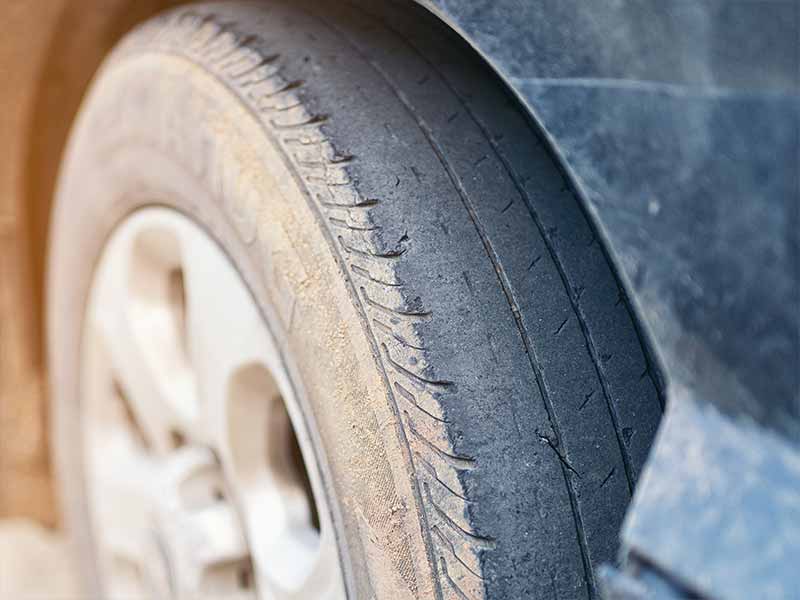Obviously, you should regularly rotate your tires. But, what happens if you forget to rotate them? Well, it depends on how long it’s been between tire rotations.
Front and rear tires wear unevenly compared to each other. This is especially true for front wheel drive car tires.
Forgot To Rotate Tires? What Happens…
Tire rotation is usually required to maintain your tire wear warranty. If you realize that you’ve forgotten to have your tires rotated, check the documentation provided with your tires and make sure you have actually missed the required tire rotation window.
Required tire rotation mileage varies between manufacturers and sometimes even between different tire models.
Let’s go over some of the other issues that could come up if you never rotate your tires or do so very rarely. We’ll also cover some common questions and concerns.

Is it OK to skip one tire rotation?
It isn’t OK to skip one tire rotation unfortunately. To maintain your tire warranty you need to be able to provide proof that you have properly maintained your tires. This usually consists of providing records showing you have had your tires rotated regularly.
Each tire manufacturer has different requirements for their tire warranties. Regular tire rotation is usually the main factor they check for when you are making a tire warranty claim.
The amount of mileage between tire rotations varies from manufacturer to manufacturer but 5,000 miles usually meets or exceeds their requirement.
Some tire manufacturers will have much longer intervals and the mileage interval can be different between tire models.
What happens if you wait too long to rotate tires?
Missing one tire rotation or simply not rotating your tires as often as required by the tire manufacturer will void your tire warranty but won’t usually cause any other real problems.
Never having your tires rotated or rarely having this tire maintenance service performed can lead to potentially significant issues. Not rotating your tires can lead to uneven tire wear, vibrations, tire noise, and poor performance.
How Often To Rotate Tires
If you don’t drive much or if you drive a lot, tire rotation schedule is determined by how many miles have been driven on the tires.
Tire manufacturers will specify how often you should rotate your tires in the tire mileage warranty. This is the maximum amount of miles your are allowed to drive on the tires without rotating them. If you drive further than this without having the tires rotated, the tire warranty will no longer be honored.
You must provide proof that the tires have been rotated by this amount of miles in the form of a receipt or some other form of paperwork.
5,000 miles is a common recommendation for how often to have your tires rotated. This will usually meet or exceed the tire manufacturers warranty requirement.

Is It OK To Rotate Tires Every 10,000 Miles?
If you rotate tires every 10,000 miles you will almost certainly not meet the requirement for any tire warranty. Most tire manufacturers will require tire rotations to be performed no more than every 8,000 miles.
If you’re not concerned with keeping the tire warranty valid, this still isn’t the in the best interest of your tires and will allow uneven wear to go uncorrected for longer, which means that you’ll have a more rough ride, more tire noise, shorter tread life, and less traction over the total life of your car or truck tires.
Is Tire Rotation Necessary
Tire rotation is necessary to meet the requirements for maintaining your tire warranty. That said, you don’t really need to rotate your tires. Don’t get me wrong, it’s a very good idea to do so and there are several benefits aside from simply maintaining your warranty that you’ll see.
Tire rotation will help even out uneven wear on your tires. As you drive, small differences in alignment and tire balance will cause some different wear patterns. This is especially true when comparing front tires and rear tires. It’s also somewhat true when comparing tires on the driver’s side versus the passenger side, but these differences are more minor typically.
When your tires wear unevenly you can have vibrations, tire noise, reduced performance, and shorter tread life.
The amount that tire rotation will benefit you varies based on many different factors, such as the type of vehicle and driving style. Some car owners will see minimal benefits while others can see major improvements.
If for no other reason, I recommend regular rotations to get eyes on your tires to diagnose minor issues before they become serious problems. Uneven tread wear can be an indicator of suspension and tire balance problems.
When Not To Rotate Tires
There are situations where tires can’t or shouldn’t be rotated. If you have both directional tires and staggered wheels you can’t rotate your tires.
Directional tires can only be rotated front to rear while staggered wheels can only be rotated from side to side. When both of these limiting factors are combined, there is no alternative option left to rotate your tires properly.
If you have a tire with less than 4/32″ of tread depth, it shouldn’t be rotated to the rear for safety reasons. Tires should be replaced at this point even though they are still 2/32″ away from the wear bars.
Tires lose ability to shed water efficiently as they wear down. By the time a tire only has 4/32″ of tread depth left it has very little ability to shed water and hydroplaning can become much more likely.

Rotating Tires Is A Myth!
There are some that say rotating your tires is completely unnecessary and a myth started to get you back to your local mechanic so they can find reasons to charge you more money.
I hope by now you can see that this isn’t true. If for no other reason, tire rotation is important for maintaining your tire mileage warranty. This isn’t the only benefit though.
In addition to a smoother ride, longer tread life, and better performance, having someone make sure your tires wear evenly will help identify alignment and tire balance problems early and help keep you and your passengers safe.
Final Thoughts
By far, the biggest issue with forgetting to have your tires rotated is the potential of voiding of your tire warranty. Other issues that could occur from missing a single tire rotation are pretty insignificant.
If you otherwise rotate your tires regularly, it’s unlikely that you’ll notice any problems. If you rarely have a tire rotation performed you’ll likely experience some uneven tire wear that will shorten the life of your tires.
Front wheel drive vehicles abuse front tires quote a bit. Swapping your front tires to the rear will help distribute some of the uneven wear that the front tires suffer due to the significantly different rear tire wear pattern of most cars and trucks.
Rear wheel drive and all wheel drive vehicles also benefit quite a bit from regularly rotating tires.
Resources
Below are some links you may find helpful when learning about tires





